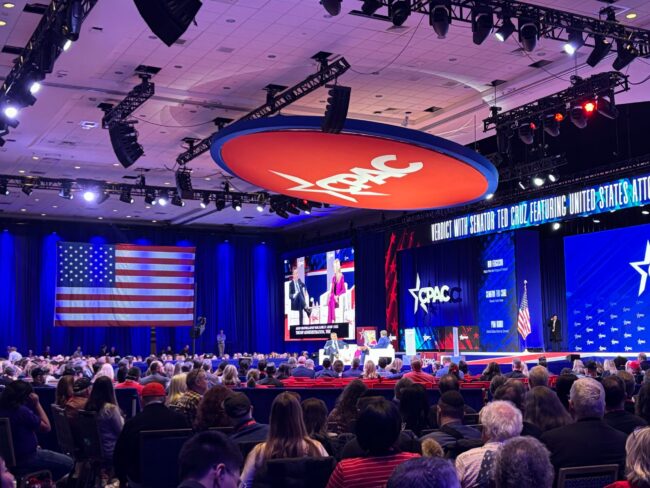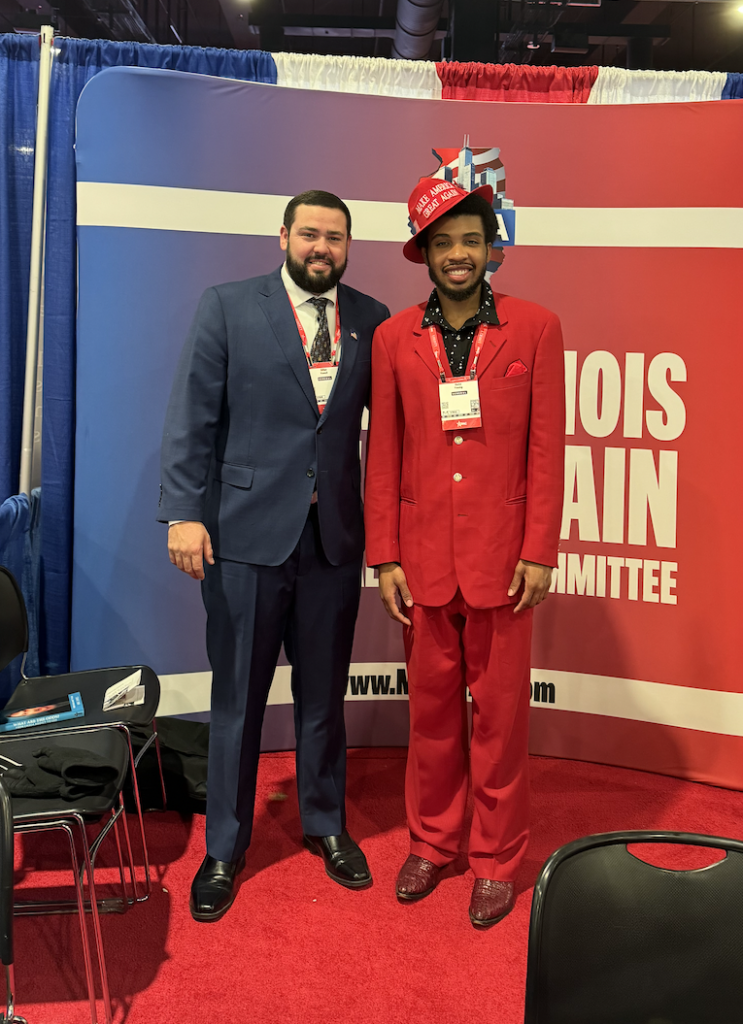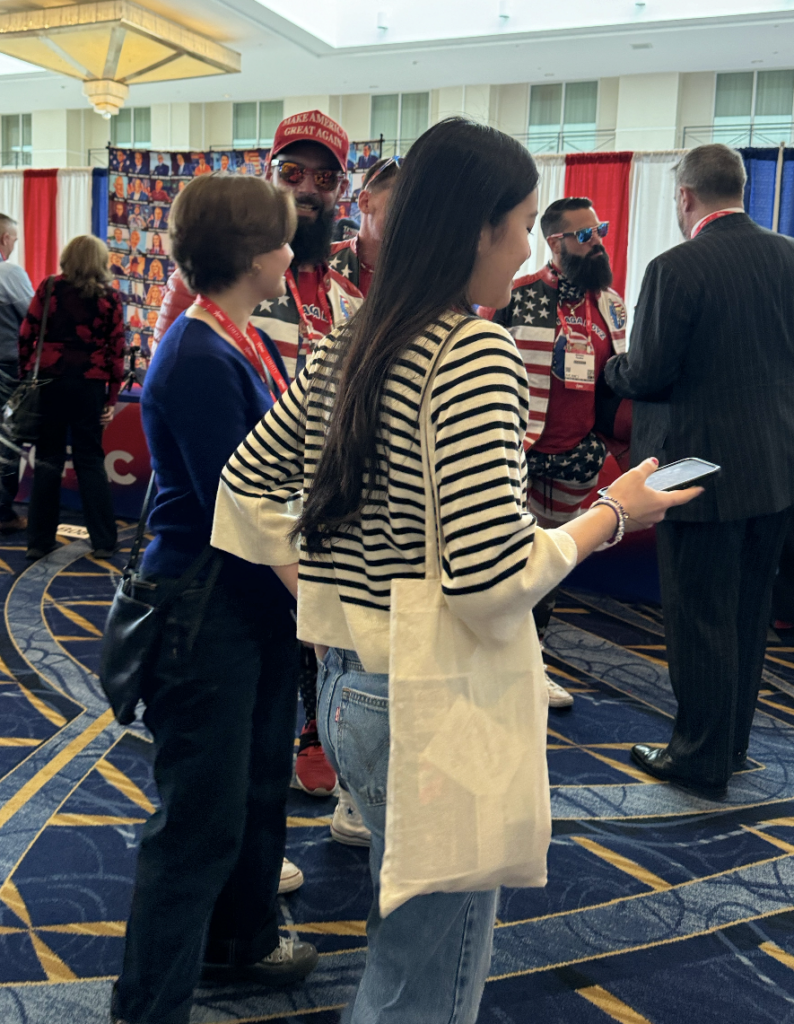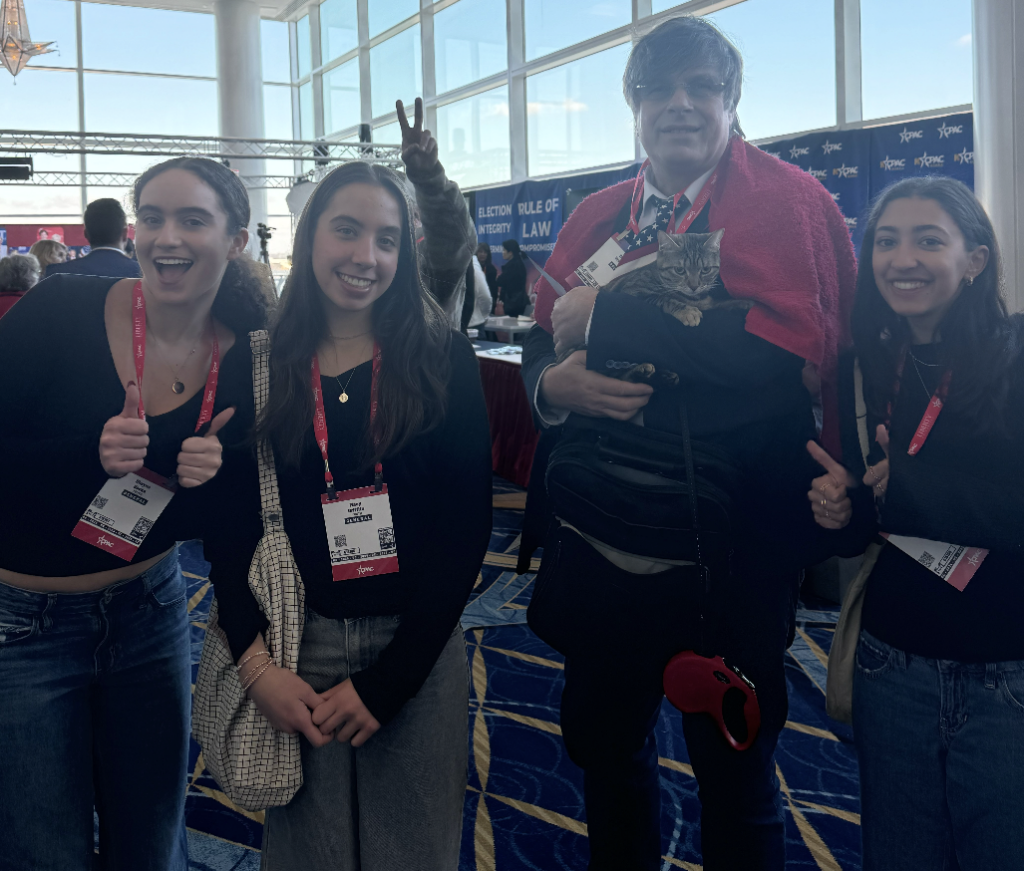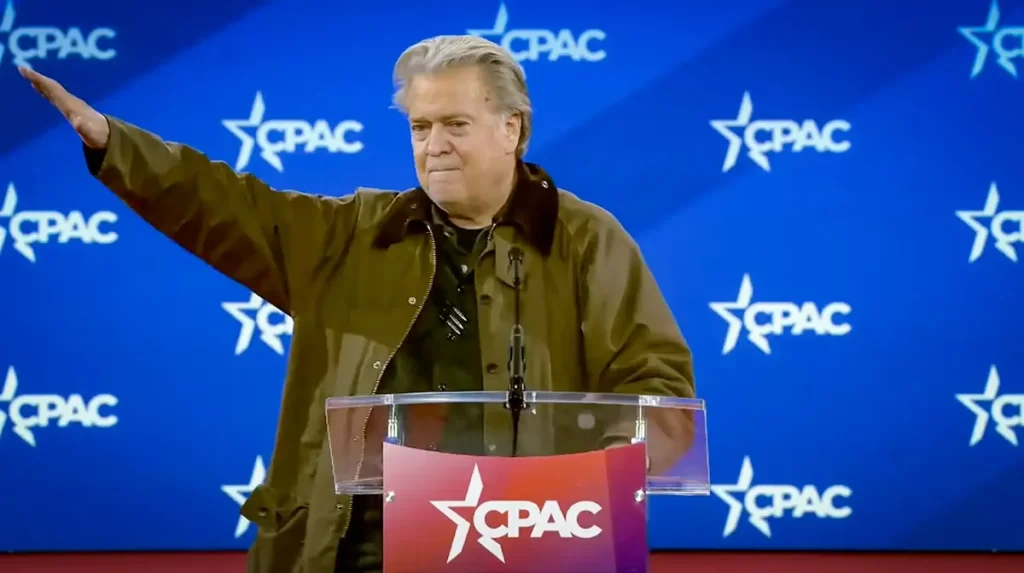“America’s Golden Age.”
This was the dominant refrain at the 2025 Conservative Political Action Conference (CPAC), which was held Wednesday, February 19 through Saturday, February 22 in National Harbor, Maryland. Speakers included newly inaugurated President Donald Trump and Vice President J.D. Vance, Department of Government Efficiency (DOGE) frontman Elon Musk, Attorney General Pam Bondi, former White House Chief Strategist Steve Bannon and an array of other elected U.S. officials, media personalities and international leaders. Attendees milled about the convention center in American flag-patterned dresses, head-to-toe MAGA merch and leggings imprinted with an image of the Founding Fathers, bearing leather jackets, cowboy hats and cardboard cutouts of Trump’s face. “Protecting America Now” was the conference theme, yet the event seemed more a celebration of Trump and the advent of “America’s Golden Age” – in other words, finally Making America Great Again.
Students in Fieldston’s “The Rise of The Right in Contemporary American Politics” history class, taught by Dr. Nancy Banks and Dr. Jennifer Tammi, have been attending CPAC since 2011. This year, the class had a front-row seat at an historic turning point in American politics. In the 2024 Presidential Election, Trump won both the electoral and popular votes, decisively marking a national swing towards the right. Yet “MAGA” politics is distinct from traditional forms of conservatism, emphasizing populism and anti-globalist policies with an undercurrent of Christian nationalism. These values were on clear display throughout the two days (Thursday and Friday) that my classmates and I spent at CPAC.
Thursday began with a conversation between J.D. Vance and former White House Director of Strategic Communications Mercedes Schlapp. Vance is undeniably articulate and energetic – it’s easy to see why he’s widely considered the future of the GOP. “He’s such a good speaker,” the sequin-clad woman behind me whispered to her friend. Vance quickly identified the bread-and-butter issues: immigration and economy, peppered with anti-cancel culture jargon. He and Schlapp claimed an immigration crackdown will restrict an influx of human traffickers and drug cartels preying on “angel” American families, as well as protect American jobs and entitlements. “If you get control of the border, you do more to control the financial problems that we have in this country than almost anything,” said Vance. Boosting the economy also means we’re going to “drill, baby, drill” – Vance explained, in simple terms, how unleashing energy could drive down consumer costs. DOGE, meanwhile, will redirect taxpayer money away from “progressive modern art projects centered around toilets in Afghanistan” and back towards American priorities. The administration ultimately aims to improve American quality of life through affordable housing, employment opportunities and family security.
Throughout the day, mainstage speakers addressed immigration, religion, technology, education and global affairs. Nigel Farage, leader of the right-wing populist Reform UK, and Former British Prime Minister Liz Truss praised the POTUS. “We want a Trump revolution in Britain,” said Truss. “We want Elon and his nerd army of Musk-rats examining the British deep state.” Panels like “The Takedown of Left Tech” accused the Biden administration of working with Big Tech giants to “censor speech” under the guise of misinformation. In discussion with Texas Senator Ted Cruz, Pam Bondi evoked horrific imagery of the U.S.-Mexico border: young girls’ underwear hanging from “rape trees” and “disposable children” who cross repeatedly, accompanying different “families.” Her approach to increasing deportations involves suing sanctuary cities, including New York and Chicago. “I gave a very strong warning,” Bondi said. “If you don’t comply with the law, you’re next.” Michael Knowles, a 34-year-old political commentator on the Daily Wire, endorsed Christian nationalism. “The fact that, in recent decades, our political class has largely removed God from public life, is an aberration and a national scandal,” he said. “It needs to be reversed.” Vance, in contrast, chose his words carefully. He said families should be able to safely raise children to become “good young people” in “their faith” – not necessarily Christianity.
By 4 p.m., the Potomac Ballroom was packed, brimming with anticipation for a special guest announced just hours earlier: Elon Musk. The billionaire tech mogul emerged with rapper chains swinging, oversized sunglasses and a “dark gothic MAGA” hat. Before long, he fist pumped the air, clutching a chainsaw gifted by Argentinian president Javier Milei – a reference to DOGE’s extensive government employee and budget cuts. Musk struggled through an awkward comedy routine, his words barely intelligible, with long silences punctuated by shouts of “We love you” from the audience. “I am become meme,” he said, in a response that effectively summed up the interview. “There’s living the dream and there’s living the meme, and that’s pretty much what’s happening.”
The fiery Steve Bannon speech that followed was a stark contrast to Vance’s measured language and Musk’s stardom trip. The “War Room” host roused the crowd with militant maxims, howling, “Fix bayonets, we’re charging again!” The announcement that former Senate majority leader Mitch McConnell would be retiring raised more cheers. Notably, Bannon made a motion resembling the same Sieg Hail that Musk performed at the inauguration. Mexican actor Eduardo Verástegui appeared to do the same. Subsequently, French National Rally leader Jordan Bardella cancelled his CPAC appearance. Bannon denied the gesture was a Nazi salute, responding, “If [Bardella’s] that worried about it and wets himself like a little child, then he is unworthy and will never lead France.”
It was a whirlwind two days. Yet, just one month into Trump’s second term, these CPAC speeches, panels and attendee interviews provided a glimpse into the future of American politics. Here are a few key takeaways from the conference:
Populism and the media
“Common sense” was extolled again and again. Knowles attributed shifts in Black, Latino and female voting groups to Democrats losing on “common sense.” He said, “Uniparty elites have limited the political discourse to exclude the common sense policies that people actually want (…) it does not take a PhD in philosophy or theology to know we owe more to our kids than we do to face tattooed Mexican gangsters.” Vance called Trump’s goal of establishing safety and prosperity, “pretty common sense stuff.” Bannon, too, referenced Trump’s address to the World Economic Forum on January 23, in which he deemed the 72 hours following his inauguration a “revolution of common sense.” Even NewsMax comedian Rob Carson praised the overthrow of “nonsense” in schools and return of “common sense” in a brief elevator conversation with me.
This rhetoric is indicative of Trump’s populist base. The perception of Democrats as perched in ivory towers has become widespread, evidenced both at CPAC and in exit polling. The “diploma divide” grew among voters in 2024: the Washington Post found that “voters without college degrees supported Trump by a wider margin than any Republican since 1984.” According to NBC, this equated to nearly 70% of white men and 63% of white women who were not college graduates. Bannon emphasized this success, informing the crowd that Trump had delivered “a populist nationalist revolution.” “You’ve honored every patriot in this country, every patriot grave,” he said. “You’ve honored them through your agency – this is all you.”
Suspicions surrounding the “mainstream media” are a key component of MAGA populism. Jeremiah Hooker, a Plattsburgh resident in his 40s, told me that he personally witnesses groups of immigrants (all military-aged, able-bodied men) being deposited by the busload at upstate gas stations. “I experienced it first hand, saw with my own eyes…and then the news says that’s not what’s happening,” he said. Furthermore, he noted the economic discrepancies between administrations. His business struggled under Obama and Biden, while under Trump, he’d “open up [his] center console and it [was] full of cash.” For someone like Hooker, it could be undeniably compelling to hear Bannon affirm his reality and profess that power resides in Hooker’s own hands.
This wariness has fueled the popularity of conservative podcasts, talk shows and social media influencers. Trump, buoyed by the trend, continues to engage with these sources and has begun restricting others. AP News, which has continued to refer to the “Gulf of America” as the “Gulf of Mexico,” has been barred from Oval Office events. On February 25, the White House broke precedent by announcing that they would hand-pick the pool of reporters admitted to press conferences. “We are going to give the power back to the people,” said White House Press Secretary Karoline Leavitt. “New voices are going to be welcomed in,” she announced, noting that many radio hosts and streaming services have traditionally been denied access to the pool. The notion that individuals are more reliable informants than major news corporations is shaping the national media landscape – and playing a key role in cultivating youth voters.
On February 10, the New York Times published “How Charlie Kirk Became the Youth Whisperer of the American Right,” a profile examining the rise of Charlie Kirk, media personality and co-founder of Turning Point USA. Like Ben Shapiro, Kirk is well-known for his videos featuring debates with liberal college students. In high school, Kirk gained the favor of older Tea Party activists like Bill Montgomery, who “urged [Kirk] to spread his message to college campuses rather than attending college himself.” For conservatives seeking to reach the next generation of voters, individuals like Shapiro and Kirk are emblematic of the boots-on-the-ground approach that may corral more followers towards MAGA. “We’ve got the power of persuasion,” said Vance. “We’ve got to convince our fellow citizens.”
Anti-globalism
Attitudes towards the United States’ role in the international sphere were inconsistent. “Globalism is going to die,” Matt Schlapp announced in the conference introduction. Flashy anti-globalist videos skirted across the mainstage screens. “We’ve got to make sure other countries stop taking advantage of us,” Vance said of Trump’s tariff policy, while Bannon asserted that Ukrainian president Volodymyr Zelensky is finally being “put in his place.” Yet, there was a global presence in the audience.
A significant portion of the conference was dedicated to reiterating the United States’ commitment to standing with Israel. Two freed Israeli hostages were present in the audience, one panel hosted family members of Israeli hostages and another breakout group discussed “A New Take on Mid-East Peace.” While this support for Israel is seemingly at odds with the Christian nationalism on display, there is a long history of Christian alignment with Zionism. Many U.S. evangelicals, for example, believe the creation of the state of Israel was the fulfillment of biblical prophecy and that the Jewish people must return to Israel as part of the “end times” and the Second Coming of Jesus. Other Christians may be sympathetic to a nation with a strong religious identity, coupled with Israel’s position as a major non-NATO military ally that shares regional interests. Ultimately, unity with Israel appeals to the desire for a clear, simple, dualistic approach to a complex geopolitical issue. However, this vociferous support for the Jewish state is in tension with the overt anti-semitism on display (the notorious Nazi salutes, for example), which may pose a challenge to a long-term alliance between Israel and MAGA Republicans.
Santiago Abascal, the leader of Spain’s hard-right Vox party, joined Brits Farage and Truss on stage. Friday’s agenda consisted of speakers from CPAC chapters in Japan, Australia and Korea. In the exhibition hall, I spoke with a representative from CPAC Hungary who was excited about the rise of the right under President Viktor Orbán. The European contingent largely praised Vance’s controversial address at the Munich Security Conference on February 14. “JD called them out in this speech and he was right,” said Farage. The crowd applauded as Vance insisted that the U.S. relationship with our traditional European allies will be contingent upon the adoption of “shared values.” “We do not have shared values if you’re jailing people for saying we should close down our border (…) if you cancel elections because you don’t like the result (and that happened in Romania) (…) if you’re so afraid of your own people that you silence them and shut them up,” he said. Echoing his Munich address, he suggested that the greatest threat to the Western world is attacks on “free speech.” This alignment on “shared values” presumably justifies CPAC’s transnational presence despite its anti-globalist stance – foreign leaders who advocate mimicking U.S. policies are welcomed as allies.
Vance also defended Trump’s negotiations with the Kremlin, claiming that, “You’ve got to talk to everybody involved if you want to bring the conflict to a close.” On Friday, Slovakia’s Prime Minister, Robert Fico, further broached the topic of Russian relations. “No one is disputing that Russia’s use of military force in Ukraine was a violation of international law,” he said. “However, Russia had serious security reasons for doing so.” He continued on, contending that Zelensky “needs the war” because “when there is war, there cannot be Democratic elections.” Recent Pew polls found that American views on the Ukraine war have shifted significantly since the conflict began. Now, 47% of Republicans and 14% of Democrats say the U.S. is giving Ukraine too much support. Yet, Trump critics have expressed anxieties about turning away from longtime European allies and potential national security threats posed by Russia, while Europeans grapple with the president’s opposition to NATO and support for Ukraine. Leaders such as French President Emmanuel Macron and British Prime Minister Keir Starmer have begun making their cautious appeals while increasing domestic defense spending. For now, the future of U.S.-E.U. relations remain on rocky ground.
Executive power
Perhaps the most prominent question was how far the President’s jurisdiction can and should extend. There was no consensus – while a few attendees displayed uneasiness about his “LONG LIVE THE KING” “jokes” on X, many were enthusiastic about the expansion of his power and would “happily” vote for him again. Bannon announced to whoops from the crowd, “We want Trump in 28.”
Trump has been slapped left and right with lawsuits challenging his myriad executive orders, including the firing of government watchdogs and dismantling of government agencies. Though a federal judge ordered him, on February 13, to resume the flow of USAID, the White House has yet to provide evidence that he has done so. On February 26, his nominee for solicitor general told the Senate Judiciary Committee that presidents could conceivably defy court orders in “extreme cases.” On February 25, more than 20 DOGE employees resigned, writing, “We will not use our skills as technologists to compromise core government systems, jeopardize Americans’ sensitive data, or dismantle critical public services.” Yet, in conversation with Fieldston students, radio host Tony Katz, maintained that Trump is not exercising “unchecked” power since 77 million Americans voted for him.
Many MAGA supporters believe that Trump is enacting corrective policies to address deeply entrenched corruption. Annette Parchert, a former Democrat, told me that Trump’s overhaul of the DOJ and dedication to “transparency” were among her top priorities as a voter. As heads of DOGE and the DOJ, Musk and Bondi were authorities on this topic. Musk claimed that the rough estimate of fraudulent entitlement payments is “500 billion per year.” Meanwhile, Bondi condemned the political weaponization of the DOJ against Mayor Eric Adams and Trump, declaring that the “incredibly weak” case against Adams was fabricated to block deportation efforts in New York and denouncing the FBI raid on Mar-a-lago.
Between his felony conviction and assassination attempt over the summer, Trump was consistently cast as a Napoleonic figure – a symbol of defiance and an American martyr. Bannon likened him to George Washington and Abraham Lincoln, and Farage called him “the bravest man” he knows. Trump has embraced this characterization. In true magnate fashion, he’s proposed buying Greenland and turning the Gaza Strip into the “Riviera of the Middle East” (most recently posting an AI video projection of “Trump Gaza”). He quoted Napoleon on X, saying, “He who saves his Country does not violate any Law.” This, however, seems to contradict Bondi’s statement that, “No one is above the law.”
Regardless of inner-party divisions on specific issues, CPAC stood united behind one thing: Trump. “The shock and awe strategy,” as Mercedes Schlapp said, has marked his first weeks in office.
For now, most Americans can only wait and watch as a new political landscape unfolds. Perhaps it’s the Golden Age of America. Perhaps the Golden Age of Authoritarianism.

